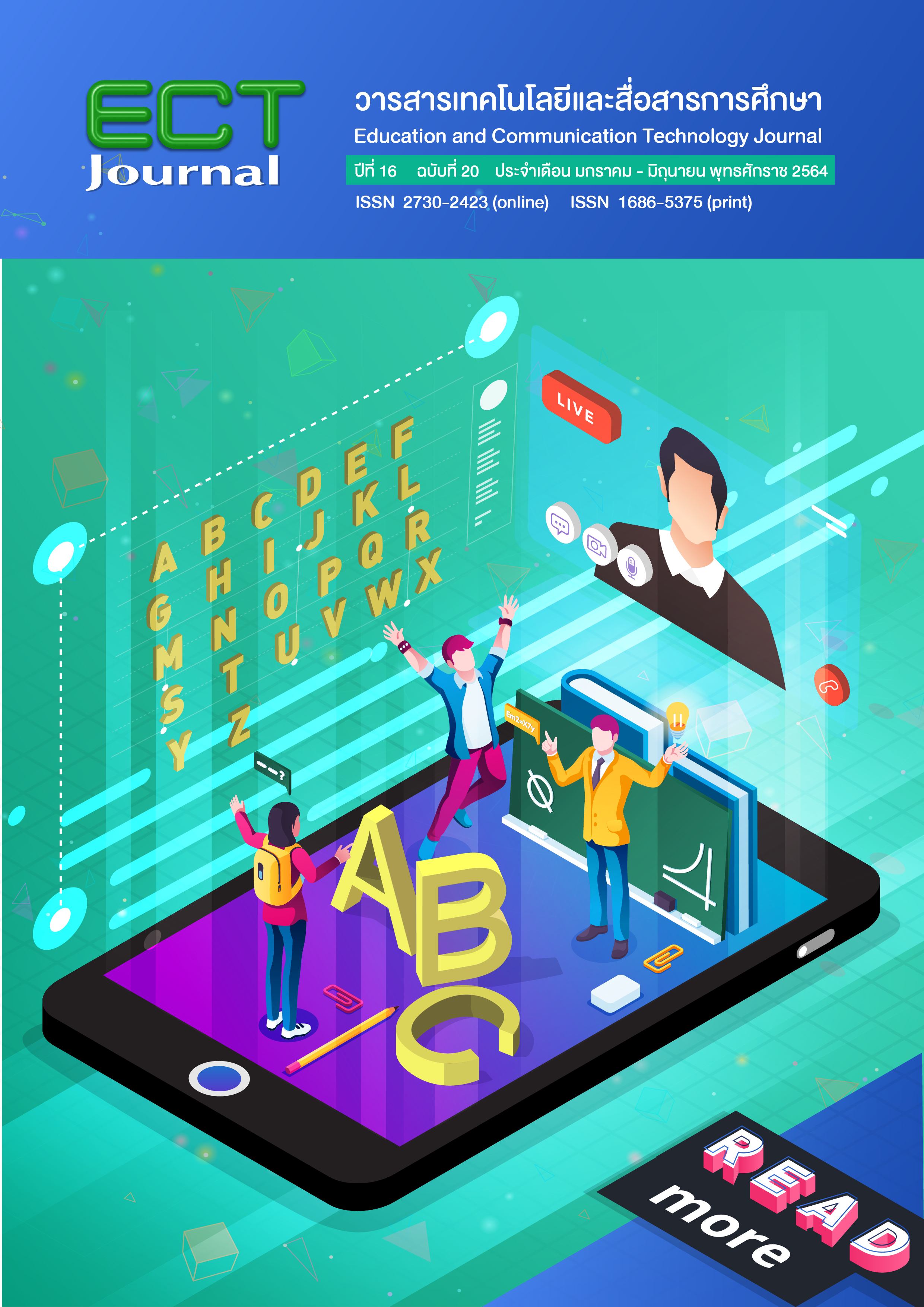Development of an Online Instructional Model Based on Mooc Instructional Standards and Practice to Using Problem Based Learning to Enhance Problem Solving Thinking Skill for Sukhothai Thammathirat Open University Students
Keywords:
Online instructional model, Problem based learning, MOOC instructional standards and practiceAbstract
The objectives of this research were (1) to develop an online instructional model based on MOOC instructional standards and practice to Using problem based learning;
(2) to study learning achievement of students who learned from the online instructional model based on MOOC instructional standards and practice to Using problem based learning; (3) to study problem solving thinking skill for Sukhothai Thammathirat Open University students; (4) to study opinions of students who learned from the online instructional model based on MOOC instructional standards and practice to Using problem based learning based. The research sample consisted of 30 purposively sampling undergraduate
students of the School of Management Science, Sukhothai Thammathirat Open University, this research was a research and development.
The research results could be concluded as follows:
1) the developed online instructional model had four following steps: 1.1 induction step, 1.2 learning step, 1.3 evaluation step, and 1.4 summative evaluation step.
2) the pre-tests and post-tests were used to compare before and after learning achievements of the participants. The average score of after learning with the model was higher than the other, and they were significantly different at the .05 level.
3) regarding the result of studying the problem solving thinking skill as a result of doing instructional activities while learning under the developed online instructional model at the high level (M = 3.42, SD = 0.58).
4) regarding the result of studying opinions of the students, it was found that their opinions were at the highest level (M = 4.54, SD = 0.45).
References
กิดานันท์ มลิทอง. (2548). เทคโนโลยีการศึกษาและนวัตกรรม. อรุณการพิมพ์.
ชัยยงค์ พรหมวงศ์. (2550). การพัฒนาหลักสูตรและสื่อการเรียนการสอน: สื่ออิเล็กทรอนิกส์เพื่อการศึกษา. มหาวิทยาลัยสุโขทัยธรรมาธิราช. https://www.stou.ac.th/Services/library/courselib/Instructional%20Media.pdf
ฐาปนีย์ ธรรมเมธา. (2557). อีเลิร์นนิ่ง: จากทฤษฎีสู่การปฏิบัติ. สหมิตรพริ้นติ้งแอนด์พับลิสชิ่ง.
ถนอมพร เลาหจรัสแสง. (2545). Designing e-Learning: หลักการออกแบบและการสร้างเว็บเพื่อการเรียนการสอน. โรงพิมพ์อรุณการพิมพ์.
เนาวนิตย์ สงคราม. (2559). รายงานการวิจัย เรื่อง ระบบการเรียนด้วยอีเลิร์นนิ่งบนสภาพแวดล้อมการเรียนรู้เสมือนจริงเพื่อพัฒนาความสามารถในการแก้ปัญหาและการเรียนรู้เป็นทีมสำหรับนิสิตศึกษาครุศาสตร์บัณฑิตในสถาบันอุดมศึกษาของรัฐ. คณะครุศาสตร์ จุฬาลงกรณ์มหาวิทยาลัย. https://elibrary.trf.or.th/project_content.asp?PJID=RDG5750052
ปราวีณยา สุวรรณณัฐโชติ และเสมอกาญจน์ โสภณหิรัญรักษ์. (2560). มาตรฐานและแนวปฏิบัติการเรียนการสอน MOOC ที่ได้รับการยอมรับในระดับนานาชาติ. วารสารบัณฑิตศึกษามหาวิทยาลัยราชภัฏวไลยอลงกรณ์ในพระบรมราชูปถัมภ์, 12(2), 244-256. https://so01.tci-thaijo.org/index.php/VRUGradJour/article/view/112724
พิศิษฐ์ สุวรรณแพทย์. (2557). การพัฒนารูปแบบการเรียนการสอนแบบผสมผสานโดยใช้ปัญหาเป็นฐานและการเรียนรู้แบบสืบสอบเพื่อเสริมสร้างความคาดหวังวิชาฟิสิกส์สำหรับนักศึกษาระดับปริญญาตรี [วิทยานิพนธ์ปริญญาดุษฎีบัณฑิต, มหาวิทยาลัยศิลปากร]. คลังข้อมูลดิจิทัล มหาวิทยาลัยศิลปากร. http://www.thapra.lib.su.ac.th/thesis/showthesis_th.asp?id=0000012193
มหาวิทยาลัยสุโขทัยธรรมาธิราช. (2562). มุมมองผู้ก่อตั้ง STOU. https://www.stou.ac.th/main/history.html
รุจโรจน์ แก้วอุไร. (2543). การพัฒนาระบบการเรียนการสอนผ่านเครือข่ายใยแมงมุม [วิทยานิพนธ์ปริญญาดุษฎีบัณฑิต, มหาวิทยาลัยศรีนครินทรวิโรฒ]. ฐานข้อมูลวิทยานิพนธ์อิเล็กทรอนิกส์ มหาวิทยาลัยศรีนครินทรวิโรฒ. https://thesis.swu.ac.th/swuthesis/Ed_Tech/Rujrote_K.pdf
ศันสนีย์ เลี้ยงพาณิชย์. (2561). รูปแบบการเรียนแบบดิจิทัลโดยใช้ปัญหาเป็นฐานในยุคไทยแลนด์ 4.0. วารสารปัญญาภิวัฒน์, 10(ฉบับพิเศษ), 15-30. https://so03.tci-thaijo.org/index.php/pimjournal/article/view/137851
เอกนฤน บางท่าไม้, อนิรุทธ์ สติมั่น, และฐิติมา เนียมสุวรรณ. (2560). การพัฒนารูปแบบกิจกรรมการเรียนการสอนโดยใช้ปัญหาเป็นฐานเพื่อส่งเสริมความสามารถในการแก้ปัญหาในรายวิชาการถ่ายภาพดิจิทัล สำหรับนักศึกษาระดับปริญญาตรีคณะศึกษาศาสตร์ มหาวิทยาลัยศิลปากร. วารสารศึกษาศาสตร์ มหาวิทยาลัยศิลปากร, 15(1), 102-117. https://so04.tci-thaijo.org/index.php/suedujournal/article/view/146097
Bawane, J., & Spector, M. J. (2009). Prioritization of online instructor roles: Implications for competency-based teacher education programs. Distance Education, 30(3), 383-397. https://doi.org/10.1080/01587910903236536
Boud, D. (Ed.). (1982). Developing student autonomy in learning. Nichols Publishing.
Carley, M. A. (2008). Adult learning theories. CALPRO.
Cooper, L. (2000). Online course. The Journey, 27(8), 86-92. https://www.learntechlib.org/primary/p/10765/
Gagné, R. M. (1997). The conditions of learning (3rd ed.). Holt, Rinehart and Winston.
Joyce, B., & Weil, M. (2009). Models of teaching (8th ed.). Pearson.
Keller, J. M., & Dodge, B. (1982). The ARCS model of motivational strategies for course designers and developers. Training Developments Institute. https://eric.ed.gov/?id=ED222184
Knowles, M. S. (1980). The modern practice of adult education: From pedagogy to andragogy. Cambridge Adult Education. https://www.worldcat.org/title/modern-practice-of-adult-education-from-pedagogy-to-andragogy/oclc/5447548
Kurubacak, G. (2000). On-line learning: A study of students' attitudes towards web-based instruction [Conference paper]. AECT 2000 Conference, Long Beach, CA, United States. https://www.learntechlib.org/p/89650/
Saiz, F. B. (2013). Online learners' frustration: Implications for lifelong learning. In U. Bernath, A. Szücs, A. Tait, & M. Vidal (Eds.), Distance and e-learning in transition (pp. 635-651). John Wiley & Sons.
Yang, S. P. (2002). Problem-based learning on the World Wide Web in an undergraduate kinesiology class: An integrative approach to education [Master's thesis, University of New Brunswick]. Library and Archives Canada. https://central.bac-lac.gc.ca/.item?id=MQ75319&op=pdf&app=Library&oclc_number=971767863
Downloads
Published
How to Cite
Issue
Section
License
Copyright (c) 2021 มหาวิทยาลัยสุโขทัยธรรมาธิราช

This work is licensed under a Creative Commons Attribution-NonCommercial-NoDerivatives 4.0 International License.
1. ทรรศนะและข้อคิดเห็นใด ๆ ที่ปรากฏอยู่ในวารสาร ECT Education and Communication Technology Journal เป็นของผู้เขียนโดยเฉพาะ สำนักเทคโนโลยีการศึกษา มหาวิทยาลัยสุโขทัยธรรมาธิราช และกองบรรณาธิการไม่จำเป็นต้องเห็นพ้องด้วย
2. กองบรรณาธิการของสงวนลิขสิทธิ์ในการบรรณาธิการข้อเขียนทุกชิ้น เพื่อความเหมาะสมในการจัดพิมพ์เผยแพร่






